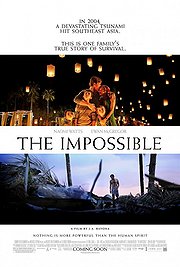Disaster movies are often tough to watch, especially ones that are based in actual events and tell the story of actual people in crisis. Sometimes the director gins up the drama, amplifies the disaster, focuses on the mayhem, and the human story gets swallowed up in a tidal wave of action.
‘The Impossible’ directed by Juan Antonio Bayona is not like that. It is a sensitive portrayal of one particular family caught up in the tsunami of Dec. 26th 2011 that hit the coast of Thailand, arguably the worst tsunami of all time in terms of the human toll and material damage it caused. The film however doesn’t focus on the terrible events— they come very early in the film. The film focuses on the agonizing search of members of one family to find and rescue its other members.
This film has been nominated already for some awards, in particular Naomi Watts as Maria has been singled out as a best actress candidate. Ewan McGregor as the husband Henry is also very good in this film, although, as is often the case, the children frequently steal the show, especially Tom Holland who plays the brave oldest son, Lucas.
This is one of those films where the pathos of the story is really bigger than the acting itself, and indeed there are not a lot of memorable lines in the film. Even with Naomi Watts the skill is in the physical acting, working through the trauma, and not in the way she delivers her lines so much. In that regard, Sally Fields is a much better candidate for the best actress Oscar, but then, disaster films are not about eloquent soliloquies usually. They are testimonies to the resiliency of the human spirit, and this one is no different.
The film is only an hour and 47 minutes, but because of the agony of lostness, pain, and longing to find others, it seems much longer at points. The desperation of the search comes to a boiling point near the end of the film where the main characters keep missing each other though they are in close proximity. To me one the telling aspects of the film is that we are dealing with a story that is told as if there is no God, and no one in the whole film is shown praying or crying out for divine assistance.
Instead it shows people for whom this life, and their immediate family are all there is, and ultimately the only thing of abiding importance to them…… except for the instinct towards compassion, for instance when Maria tells son Lucas to go and help some others, and he does, repeatedly. The disaster has brought him out of his natural self-centered selfish world, and he is a better and stronger person for it by the end of the film. The doling out the milk of human kindness has changed him.
I liked this film quite a lot. It was beautifully filmed and the story was not rushed. It had an air of reality to it. It showed just how true it is that ‘no man is an island’, indeed we are made for relationship, and we need those relationships, especially the familial ones, very badly.
I would say that this film is o.k. to take children to see, at least children of school age. There is much to be learned here about what really matters in life. The brief nudity in the film, caused by the disaster is really not a problem, nor is there bad language or overly violent scenes to discourage a family viewing of the film. I can see families having a good discussion after seeing this about what really matters in life.
This film is not really about the ‘impossible’ because of course it actually happened. Maybe the title should have been ‘the wildly improbable’ but then that is forgetting the Man behind the current for whom all things are possible, including even some humanly impossible ones. God can work all things together for good, even for those who do not know he exists. One wonders if this ever dawned on the family in question, after the fact.













